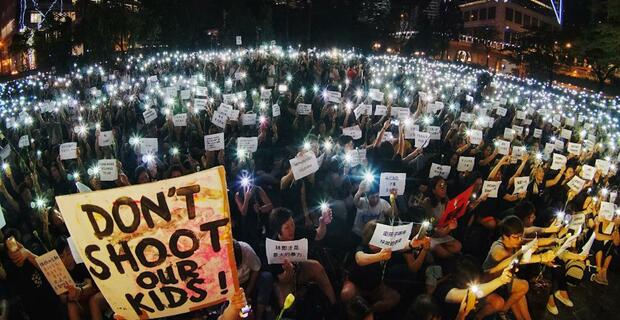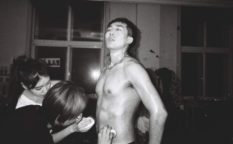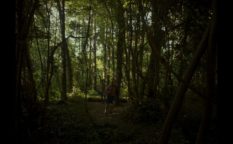Review: We Have Boots (2020)

For Evans Chan, the filmmaker based in Hong Kong and New York, his native city serves as the bottomless well of inspiration for his fiction and documentary work. Throughout his career, from To Liv(e) (1991) on, there is a line of chronicling the changes in the Hong Kong society, stuck between two imperial forces, the British and the Chinese. His latest feature-length documentary We Have Boots started with an intention to be a short appendix of his previous film Raise the Umbrellas (2016), dealing with the grim aftermath of the Umbrella Revolution and the Occupy Central movement, but ended up as an over two-hour-long recapitulation of the tempestuous recent history of Hong Kong. It premiered in the focus ‘Ordinary Heroes: Made in Hong Kong’ at Rotterdam earlier this year, but the version screened at Sheffield Doc|Fest that we saw was amended with the events as recent as the Beijing-imposed National Security Law from May.
We Have Boots is a documentary composed of the usual ingredients, like the archival footage (sometimes even from private sources and in authentic, cell phone quality), the footage from the more recent protests (including the tracking shots from a drone), the interviews with those involved – usually politicians from the ranks of the more radical, independence-seeking members of Occupy / Umbrella movement, and a lot of textual info-cards that provide more of the historical context. The idea was to paint the holistic, detailed picture of the fight for democracy while under constant threats by the Chinese political culture that aims to impose control from the Party central, often using the laws from the colonial times. The other question Chan opens is the efficiency of the non-violent civil disobedience methods (the protestors and their leaders quote Gandhi and Martin Luther King as their role-models) when countered by the violence of the police and pro-Beijing mobs, which leads to the new wave of radicalism not only in the terms of demands and the identity claims (for some, Hong Kong is a separate nation and culture that is under threat by the Chinese immigrants), but also when it comes to actions.

While in the first half of the film Chan, who was his own editor, struggles to create a sense of continuity by jumping back and forth from the Occupy times (2014) to the Umbrella times (2016) which affects the viewers who might not have the detailed information about the recent political history of Hong Kong, the second half works like a well-oiled machinery. Once the time frame is more or less established as linear, especially regarding the events surrounding the infamous Extradition Bill and Be Water incarnation of the Occupy movement, We Have Boots becomes a clear, arresting piece of filmmaking and storytelling, adding another layer to its informativeness.
Some things, however, get a bit lost in the mix and therefore seem underdeveloped, which is the case with the socio-economic range of consequences of the recent Chinese migrations and the day trips from the other side of the border creating the surge in prices of the real estate and the consumer goods. On the other hand, it is extremely hard to include and develop everything to a complete extent in a limited time frame. Evans Chan did his best in his effort to picture an inflation of history happening right before our eyes, and to create an urgent and important documentary which We Have Boots certainly is.
Runtime: 128′
Countries: Hong Kong, USA
Languages: Cantonese, English
Directed by: Evans Chan
Written by: Evans Chan
Cinematography by: Ho Lai Yick, Mo Ming, Wong Hing Hang, Nero Chan, Lee Jeong Hun
Editing by: Evans Chan
Music by: Fast Forward (courtesy of Lovely Music)
Post production by: Vivian Wong
Assistant director: Kylie Tung
Coverage collaborators: Nora Lam, Thomas Leung, Nate Chan, Kylie Tung, Fung Ming-sum
Produced by: Williams Cole
Associate producers: Russell Freedman, Ho Ylet-fung
Production company: NYHK Productions Ltd.
















